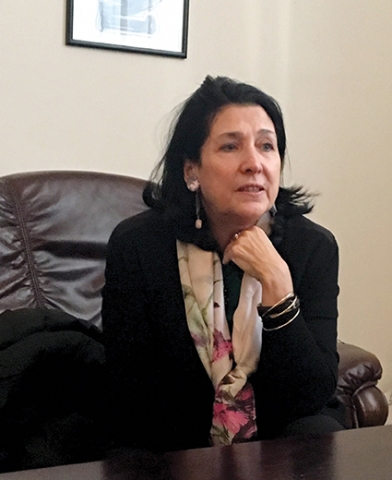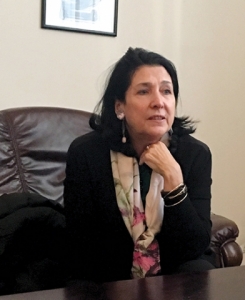Salome Zurabishvili Begins Her Reign
Salome Zurabishvili has officially begun her work as President of Georgia. As President, Zurabishvili is making history in several ways: she is the country’s first female president, she is the first president to have been born and raised outside of Georgia, and she is the first president who represents a cooperative, respectful transition of power from one regime to the next. She has also made the surprisingly controversial decision to work out of Orbeliani Palace on Atoneli Street rather than the dramatic, flashy modern glass and metal Presidential Palace built by former President Mikheil Saakashvili, often referred to as “the egg.”
One of the most interesting features of Zurabishvili’s heavily-guarded, private inauguration ceremony was her statements about previous leaders of Georgia. With an air of conciliatory respect, she noted the positive achievements of the presidents who came before her, including political opponents. It was also the first time a former president attended the inauguration of his successor. Giorgi Margvelashvili was gracious and professional in passing his mantle on to President Zurabishvili.
Although the role Zurabishvili holds is now primarily ceremonial and symbolic rather than political, she still sets the agenda for Parliament and has the power to call attention to important issues. She is an influential voice in the halls of Georgian political power and policy-making circles. Officially, Zurabishvili declares herself an independent politician, but she has a close affiliation with the ruling Georgian Dream party whose massive public relations campaign and deep pockets before the presidential run-off elections earlier this month preceded Zurabishvili’s victory.
In accordance with constitutional amendments, this was the final presidential election to be conducted by a popular vote of citizens. In the future, presidents will be chosen by an electoral college comprised of the members of the Parliament of Georgia and 150 others. This is expected to lead to more coherence between Parliament and the President. Zurabishvili, as she is technically outside the ruling party structure, may bring a valuable critical perspective to the role. As a former diplomat, and perhaps in part because she grew up and began her career outside the tight-knit Georgian political community, she has so far avoided the dirty, aggressive tactics commonly used by oppositional voices from all sides of the Georgian political spectrum. Pundits expect that the new president will be able to voice opposition or criticism of actions taken by the Government of Georgia without the conversation descending into name-calling or physical violence.
However, Zurabishvili’s presidency, from the beginning of her campaign through her inauguration, has been marked by vocal, aggressive opposition. During her inauguration ceremony near Telavi, massive street protests broke out around police road blocks, leading to several injuries and, later on, arrests. It is yet to be seen whether opposition voices will agree to fully participate in the political process or continue to boycott votes and call for public protests.
On her first day in office, President Zurabishvili walked to work, flanked by staff and press. She announced that the Head of her Administration will be Lasha Zhvania, who served as Minister of Economy in the Saakashvili government and most recently as head of the Patriarch’s Humanitarian Fund, and the Parliamentary Secretary will be lawyer Dimitri Gabunia. The composition of her cabinet is not yet known, but she promised the press that her administration will be fully staffed by next Monday. In another break from tradition, Zurabishvili made it clear that the media will be welcome and their position formalized within the Atoneli Street Palace. She plans to create a media club to have regular discussions with journalists on important topics. “Your house will be here,” the President told members of the press on Tuesday, pledging to maintain “normal relations” between the Presidential Administration and the media.
By Samantha Guthrie












